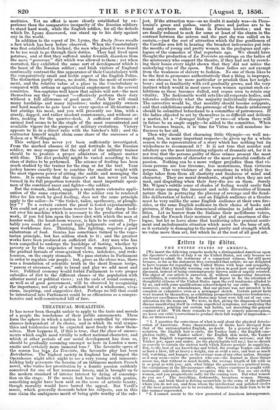THEATRICAL MORALITIES.
IT has never been thought unfair to apply to the taste and morals of a people the touchstone of their public amusements. These form the sphere in which a nation is least controlled by circum- stances independent of its choice, and in which its real sympa- thies and tendencies may be expected most freely to show them- selves. How happens it, if this is true, that the class of amuse- ments which ought most vividly to reflect national character, and which at other periods of our social development has done so, should be gradually assuming amongst, us here in London a more exotic and certainly more immoral tone ? The favourite opera of the season has begn La Traviata, the favourite play has been Retribution. The-highest society in England has thronged the Operahouse night after night to see a very young and innocent- looking lady personate the heroine of an infamous modern French novel, who varies her prostitution by a frantic passion suddenly conceived for one of her numerous lovers, and is brought up to the modem standard of intense interest by dying of consump- tion on the stage. If the music had been instinct with genius, something might have been said on the score of artistic beauty, though morality would have barred the appeal. But Verdes music, which generally descends below his subjects, can in this case claim the ambiguous merit of being quite worthy of the sub- ject. If the attraction was—as no doubt it mainly was—in Picco- lomini's grace and pathos, surely grace and pathos are to be found anywhere rather than in Parisian lorettes ; and we are finally reduced to seek for some at least of the charm in the contrast between the actress and the part she was called on to sustain,—just the sort of attraction which the fine gentlemen of the Caroline a3ra felt in hearing the broadest indecencies put into the mouths of young and pretty women in the prologues and epi- logues of the comedies of that reprobate age. We should have thought the production of La Trariata an outrage on the ladies of the aristocracy who support the theatre, if they had not by crowd- ing their boxes every night shown that they did not notice the underlying vice of the opera. But these ladies are not exempt from the weakness of slavery to fashion. No one of them likes to be the first to pronounce authoritatively that a thing is improper, no one chooses to be more particular or prudish than her neigh- bour ; and so familiarity with evil gradually grows, and the very instinct which would in most cases warn women against such ex- hibitions as these becomes dulled, and ceases soon to retain any vitality. The fashionable world acts like all corporate bodies, and tolerates collectively what the majority individually disapprove. The corrective would be, that morality should become col-perste, and that exhibitions under the patronage of the female aristocracy should be submitted beforehand to a committee of patronesses. If the ladies objected to act by themselves in so difficult and delicate a matter, let a "dowager bishop" or two—of whom there will in future be an ample supply—be added to the committee. When Vice becomes brazen, it is time for Virtue to call mundane in- fluences to her aid.
Then why should that charming little Olympic—so well ma- naged, too, in many important respects—be given up for a whole season to the representation of a story which has nothing but its wickedness to recommend it? It is not true that murder and adultery are the most interesting subjects of dramatic art, for it is not true that the persons guilty of these crimes present the most interesting contrasts of character or the most powerful conflicts of passion. Nothing can be a more vulgar prejudice than that vi- cious persons are less tiresome, less monotonous, than virtuous persons. The very violence of the sensations in which they in- dulge takes from them all elasticity and freshness of mind and character. They are moral drunkards, stupid when they are not mad, and disgusting when their fury-fits are on them. Surely Mr. Wigan's subtik sense of shades of feeling would easily find better scope among the innocent and noble diversities of human nature than in portraying the plirensy of revenge and the fiend- like deliberation of hatred ; and an English audience at a theatre must be very unlike the same English audience at their own fire- sides, or the same English audience in their choice of books and pictures, if they need this diemoniacal stimulus to jaded sensibi- lities. Let us borrow from the Italians their mellifluous voices, and from the French their neatness of plot and smartness of dia- logue, but let us leave alone that hankering after prurient senti- ment and melodramatic situation which must be the bane of art, as it certainly is damaging to the moral purity and strength which we value more than art, but which lie at the root of all good art.


































 Previous page
Previous page